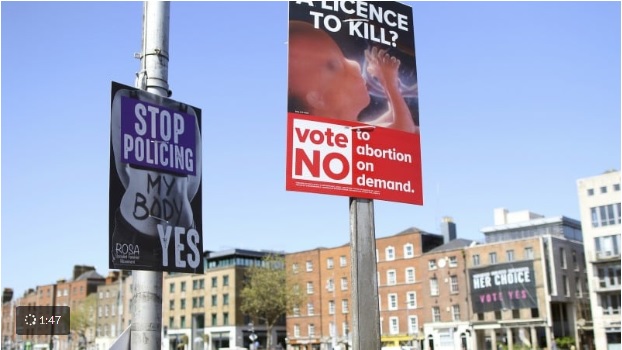 Ireland made international headlines following the result of a referendum on Friday May 25, 2018, when it decided to remove the prohibition of abortion from the Constitution, and to make provision for its regulation by legislation. The heads of a Bill to implement a yes vote was published before the referendum. This marked a huge change in Irish social attitudes over the last thirty-five years, following constitutional changes for divorce in 1995, marriage equality or same-sex marriage in 2015, and now abortion. In the controversial 1973 Roe v Wade Supreme Court decision in the United States, a constitutional right to abortion services was deemed to exist in their Constitution based on a right to privacy. As a result, a campaign was started to include a provision against abortion in the Irish Constitution. Due to intense rivalry between the two main political parties during the early 1980s, a commitment was made to put the issue to a referendum. In the 1983 referendum voters approved by 67% to 33 % to insert the Eight Amendment in the Constitution, which acknowledged ‘the right to life of the unborn with due regard to the equal right of the mother’. The decision has been controversial ever since with legal actions and some constitutional amendments, like rights to information and to travel in 1992. In the X case in 1992, the Supreme Court held that a thirteen year-old girl, who had been raped, could be allowed an abortion in the State as there was a risk to her life from suicide. The Life During Pregnancy Act of 2013 states that terminations can be provided when there is a real and substantial risk to the life of the mother, including suicide. This provision stays in place until the new legislation is enacted. Support for major reform came from a Citizens’ Assembly in 2016-17 and from an all-party Parliamentary Committee in 2017, which provided political cover for a referendum. In the May 2018 referendum, it was decided to remove the constitutional ban on abortion on a vote of 66.4 %to 33.6 %, with a turnout of 64 per cent of the electorate. The yes vote was carried in 39 of the 40 constituencies (all except Donegal), and according to exit polls by women and men, rural and urban, in all age groups and social classes. While it was a significant majority, there is also a third of the electorate strongly pro-life. There are many reasons for the decision. While access to abortion was prohibited in Ireland, it was very easy to cross the Irish Sea and avail of the service in England. There were thousands who made that journey and gave Irish addresses, while many more gave English addresses when staying with relatives. Consequently, there were a huge number of women and families with such experiences, and many had their minds made up long before the referendum was called. Personal stories of the experience were very influential during the campaign. The issue of hard cases was also a big issue, as was the death of Savita Halappanaver in 2012 after a request for a termination was refused. For many, it was a woman’s right to choose, with no regard for the life of the unborn. One of the consequences of the strong moral climate over many years was the appalling treatment of women who gave birth outside marriage, while the men involved largely escaped culpability, all of which left a bitter legacy that has yet to be exorcised. While all the churches supported the right to life for the unborn, they had little influence on the outcome with so many other factors to the fore. Note: Bernard O’Hara’s most recent book is Exploring Mayo can be obtained by contacting www.mayobooks.ie. Bernard O'Hara's book entitled Killasser: Heritage of a Mayo Parish is now on sale in the USA and UK as a paperback book at amazon.com, amazon.co.uk or Barnes and Noble It is also available as an eBook from the Apple iBookstore (for reading on iPad and iPhone), from Amazon.com and Amazon.co.uk (Kindle & Kindle Fire) and from Barnesandnoble.com (Nook tablet and eReader). An earlier publication, a concise biography of Michael Davitt, entitled Davitt by Bernard O’Hara published in 2006 by Mayo County Council , is now available as Davitt: Irish Patriot and Father of the Land League by Bernard O’Hara, which was published in the USA by Tudor Gate Press (www.tudorgatepress.com) and is available from amazon.com and amazon.co.uk. It can be obtained as an eBook from the Apple iBookstore (for reading on iPad and iPhone), from Amazon.com and Amazon.co.uk (Kindle & Kindle Fire) and from Barnesandnoble.com (Nook tablet and eReader). |